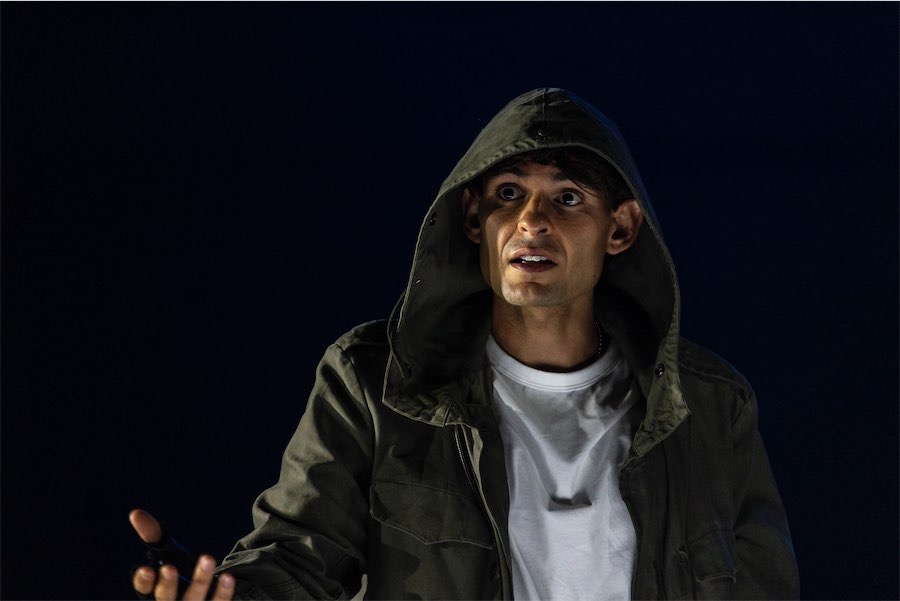Shakespeare’s Henry 5 is famous as one of Shakespeare’s most patriotic plays.
Reeking of jingoism, it’s full of household phrases such as “once more into the breach dear friends” and “we few, we happy few, we band of brothers”.
It shows the former wastrel Prince Hal, now ascended to the English throne, embarking on his most famous victory at the Battle of Agincourt in 1415.
That’s still taught in military schools and is a great example of the David versus Goliath principle, as the small English forces defeated the mighty French with only 112 deaths to their opponents’ 6000.
The play is deeply loathed by the French, and nearly caused a riot at a French theatre festival a few years ago when it was staged.
In it, Shakespeare depicts the Gallic characters as weak and foppish and the English as strong and manly.
It looks very different from a modern perspective, however as JK Kazzi, who plays Henry in Bell Shakespeare’s current production, found when he and director Marion Potts visited the real “Azincourt” in northern France last year.
There they perceived minimal signage about the battle, but once inside the empty local museum, they found Shakespeare depicted as a bulldust artist and Henry as a war criminal. Not surprising when you learn that he had thousands of French prisoners of war executed.
“We are leaning into that a bit”, Kazzi tells me, even though in a promotional YouTube video he is seen talking up the Mr Nice Guy version of his character.
Kazzi, J François Kazzi to be precise, is of Lebanese extraction with a Francophone father and some facility in French from four years of secondary schooling in Ho Chi Minh City, where he discovered that it gave him kudos with the girls, has a Gallic side to him that give himself extra insights into the play.
“We believe that our production, if anything, has given some voice to the French,” he says.
Before ending up in the acting course at NIDA, Kazzi studied media and communications at Sydney University, played around, fell in love, travelled, worked in many jobs and, in short, got life experience, a bit like the young Prince Hal.
He notes that the relatively new King Henry was 28 years old at the time of the famous battle, the same age as him.
“I’m really exposing the dark side of this role,” he says.
“When you change from Prince to King, you have to make a huge shift.
“You have to make big decisions, some require ruthlessness and brutality.”
True. Henry is shown by the Bard as anything but nice, ordering the execution of a bunch of traitors early in the play in an almost perfunctory manner.
Then there’s the moment when he publicly snubs his old mentor and drinking mate Sir John Falstaff with the words, “I know thee not old man,” a clear signal that this newly-minted God-King will be no pushover.
More sympathetically, he is found sneaking around the camps by night in disguise to suss out what the ordinary people really think of him.
“That shows his need to speak to the common man, but I don’t think he expects to hear what they say,” Kazzi tells me.
In fact, when the king overhears a conversation between Fluellen and Gower, he gets into an argument with a soldier; he is shocked.
This explains his reflections on the responsibility of kingship in the Act 4 soliloquy that begins: “Let us our lives, our souls, our debts, our careful wives, our children, and our sins, lay on the King!”
On the lighter side, one might think, is the courtship scene with Henry’s future wife Princess Katherine, daughter of King Charles VI of France, but even here there is a strong element of coercion that the audience will not miss.
“We really interrogated that scene to make it more contemporary so we don’t think it’s delightful at all,” Kazzi says.
“We are sure that Katherine is just doing what her father wants and is not charmed by Henry… in rehearsal we tried doing it the coquettish way but our challenge was to find the truth through a contemporary lens.”
“Ours is not quite the classical interrogation, but of course we’re not going to throw away those great speeches.”
“We certainly haven’t put Henry on trial, but he’s a human being and we show that,” Kazzi says.
Henry 5, Bell Shakespeare, The Playhouse, April 10-20.
Who can be trusted?
In a world of spin and confusion, there’s never been a more important time to support independent journalism in Canberra.
If you trust our work online and want to enforce the power of independent voices, I invite you to make a small contribution.
Every dollar of support is invested back into our journalism to help keep citynews.com.au strong and free.
Thank you,
Ian Meikle, editor






